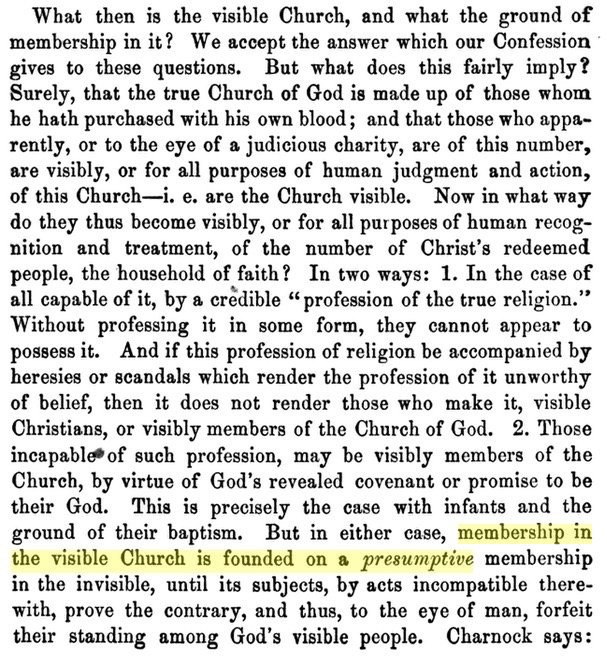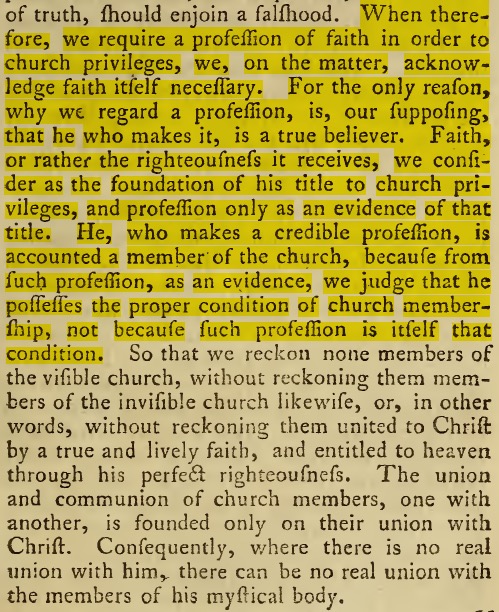Resources
Keach’s Articles of Faith
On 09, Nov 2015 | In Resources | By Brandon Adams
H/T Kenneth Clayton
In 1697, Benjamin Keach published “The articles of the faith of the Church of Christ, or, Congregation meeting at Horsley-down” because “the General and more Large Confession of the Faith of our Churches, is now out of Print; but that is not all, for that being 12 d. price, some cannot well purchase it.” and because certain beliefs held by his congregation (“that of Imposition of Hands upon baptized Believers as such, and singing of God’s Praise, &c.”) were not included in the 2nd London Baptist Confession.
Here are the sections related to covenant theology:
Of Original Sin.
*VII. WE do believe, that God having created Man, he entered into a Covenant of Life with him, upon the condition of perfect Obedience; making the first Adam a common Head to all his Seed: and that our first Parents being left to the freedom of their own Will, fell from the Estate wherein they were created, by eating of the forbidden Fruit: and that Adam being set up as a pub∣lick Person, we all sinned in him, and fell with him into a state of Sin, of Wrath and Misery; the Sinfulness of which state consists in the guilt of Adam‘s first Sin, the want of Original Righteousness, and the Corruption of our whole Nature: from whence all actual Sins proceed, as Water out of a filthy and an unclean Fountain. So that not only by Imputation all Men became Sinners in the first Adam, but also as the same cor∣rupt Nature is conveyed to all his Posterity,* who descend from him in ordinary Generation.
By this Sin all Mankind lost the Image of God,* and Communion with him, being liable to all the Miseries of this Life, and to Death itself; and also are dead in Sins and Trespasses, and obnoxious to the Wrath of God, and the eternal Pains of Hell for ever. Hence we say that all are conceiv’d and born in Sin,*and are the Children of Wrath, even the Elect as well as others, being wholly defiled in all the Faculties and Parts of Soul and Body,* and utterly indisposed and disabled to do any thing that is spiritually good, and wholly in∣clined with a strong propensity to all things that are evil.
Of Christ the Mediator.
IX. WE believe that God ha∣ving, out of his own meer good Pleasure,* and infinite Love, elected some Persons of the lost Seed of the first Adam unto everlasting Life, from all Eternity, did enter into a Cove∣nant of Grace with the second Per∣son of the Trinity, (who was set up as the common Head of all the Elect) to deliver them out of the state of Sin and Misery,* and to bring them into a state of Salva∣tion and eternal Happiness.
That the second Person in the Godhead,* (being the eternal Son of God, Coessential, and Coequal with the Father) according to that holy Covenant and Compact that was between them both, became Man, or assumed our Nature,* and so was, and continueth to be God and Man in two distinct Natures, in one Person for ever. And that he the Son of God by his becoming Man,* did take unto him a True Body, and Reasonable Soul, being conceived by the holy Spirit in the Womb of the Virgin, and was born of her, yet without Sin.
Of the Law.
XVII. WE believe God re∣quires Obedience of Man, and that the Rule of that Obedience is the moral Law as it is in the Hands of Christ;* which teacheth all Persons their Duty to God, and to Man; the Sum of all being this, to love the Lord our God with all our Hearts, with all our Souls, and with all our Strength, and our Neighbours as our selves. And that tho the Law is abolished as a Covenant of Works, and as so considered, we are dead to it,* and that dead to us; yet it remains as a Rule of Life and Righteousness for ever.
*XVIII. We believe no mere Man, since the Fall, is able in this Life perfectly to keep the Holy Law of God; and that every Of∣fence against the Law deserves eternal Death, tho some Sins are more heinous in God’s Sight than others.
And that God, as a simple Act of Mercy, will not, doth not, pardon any Man; neither doth it seem consistent with his Holiness and Justice so to do,* without a full Satisfaction:* wherefore he sub∣stituted Christ in our room and stead, perfectly to keep the whole Law, and to die,* or bear that Wrath which we deserved for our breaking of it;* he being pleased in his infinite Love and Grace to transfer our Sins, Guilt and Pu∣nishment, upon his own Son, (who took our Nature upon him, as our blessed Head and Representative) that his active Obedience and Righteousness might be our just Title unto eternal Life; and his Death (who bore our Hell-Tor∣ments) be our full Discharge from the Wrath of God,* and eternal Condemnation.
And that all who would receive this Title,* and have this Discharge so as to escape God’s Wrath, and the Curse of the Law,* must fly to Christ, and lay hold on him by Faith; which Faith is known by its Fruits, having lively, Sin-kil∣ling, Soul-humbling,* Self-abasing, Christ-exalting, and Heart-purify∣ing Operations, always attending it.
Of the First Covenant.
XXX. WE believe that the first Covenant,* or Cove∣nant of Works, was primarily made with Adam, and with all Mankind in him,* by virtue of which he stood in a justified state before the Fall,* upon the condition of his own perfect and personal Obedience. But by the Fall he made himself uncapable of Life by that Covenant.
That the Law God gave by Mo∣ses to Israel, was of the same nature of that given to Adam,* being a se∣cond Ministration of it; but not given for Life, but to make Sin ex∣ceeding sinful, and to shew how unable Man was in his fallen state to fulfil the Righteousness of God;* and so (with the Ceremonial Law) it was given in subservienty to the Gospel,* as a Schoolmaster to bring Sinners to Christ.
Of the New and Second Covenant.
XXXI. WE believe the Covenant of Grace was primarily made with the second Adam,* and in him with all the Elect, who as God-man, or Me∣diator, was set up from everlasting as a Common Person,* or as their Head and Representative; who freely obliged or ingaged himself to the Father for them, perfectly to keep the whole Law in their Nature that had sinned,* and to satisfy Divine Justice by bearing their Sins upon his own Body, i. e. the Guilt of all their Sins,* which were laid upon him: and that he sustain’d that Wrath and Curse in his Body and Soul,* that was due to them for all their Transgressi∣ons:* and having received their dis∣charge from Wrath and Condem∣nation, he gives it out to all that believe in him,* and obtain Union with him, who are thereby brought actually into the said New Covenant, and have a personal Right to all the Blessings thereof.




